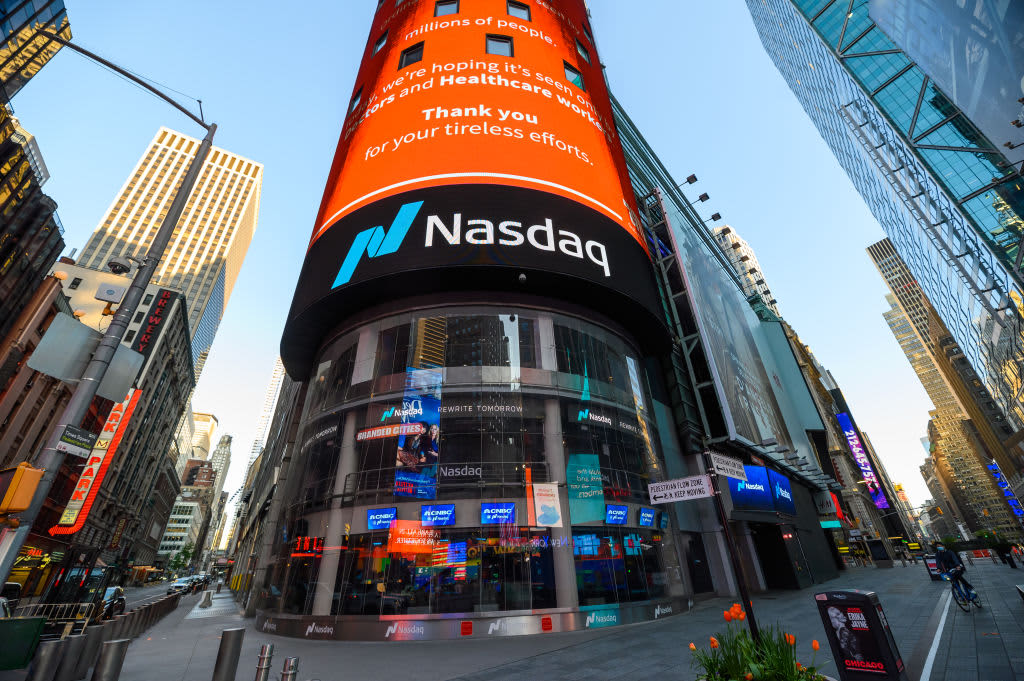S&P 500 futures rise as tech shares jump, but gains are capped as investors await election winner

U.S. stock futures rose on Wednesday, led by tech shares, but the gains were kept in check as the results of the presidential contest so far failed to yield a clear winner.
S&P 500 futures traded 0.7% higher and Nasdaq 100 futures popped 2.6% as investors crowded back into the trade that’s been working for most of this tumultuous year. Dow Jones Industrial Average futures climbed 22 points, or less than 0.1%. At one point, Dow futures were down sharply; they also posted strong gains earlier in the session.
“I think the big news for the markets right now at least as it looks preliminary is that there’s not going to be a blue wave, which is generally supportive for markets,” said Mike Lewis, managing director of U.S. equity cash trading at Barclays, on CNBC’s “Squawk Box.” “I think that the outlook going forward for markets is this is going to be more about policy and the Fed than it’s going to be about politics, which is a good thing for markets.”
Earlier in the overnight session, futures contracts for the Dow and S&P 500 came under some pressure after President Donald Trump tried to claim victory even though millions of legitimate votes were not yet counted.
“We were getting ready for a big celebration. We were winning everything, and all of a sudden it was just called off,” Trump said. “We’ll be going to the U.S. Supreme Court, we want all voting to stop.”
“We don’t want them to find any ballots at 4 o’clock in the morning and add them to the list,” he added.
Democratic nominee Joe Biden appeared to be unable to take North Carolina, with Trump holding a lead in that state, according to NBC News. However, Biden was leading in Arizona, although NBC News said it was too early to call the state. Key swing states Michigan, Wisconsin and Pennsylvania could take days to determine.
“We believe we’re on track to win this election,” Biden said to supporters in Delaware overnight. The candidate said the winner could be known Wednesday morning but it could take a little longer.
Trump is projected to win the presidential vote in Florida, Indiana and Kentucky along with South Dakota, Arkansas and Ohio, NBC News said. Trump is also projected to win Alabama and North Dakota. Biden is projected to win Vermont, Delaware, Maryland and Massachusetts as well as Colorado, New York and Virginia, according to NBC News.
“We’re seeing in one night what we’ve seen over the past two weeks, which is a tug of war within the polling itself causing wide swings in the market as uncertainty persists,” said Keith Lerner, chief market strategist at Truist/SunTrust Advisory.
Shares of major tech-related companies jumped in early premarket trading. Facebook, Amazon, Apple, Alphabet and Microsoft were all up more than 2%. Netflix shares gained 3.7%.
Wall Street traders and investors attributed the move in tech and the Nasdaq 100 futures to a number of factors, including the group’s consistently solid returns and safety appeal in times of uncertainty. Additionally, some viewed the potential for Republicans to hold onto the Senate as a positive for the group since a higher capital gains taxes from a Democrat congress could have weighed on the high growth sector.
Contested election?
Traders also grappled with the possibility of a contested election result, which Wall Street strategists say could have major consequences for the stock market. Among other things, analysts warn that a delayed result would hamper the ability of Washington to pass additional fiscal stimulus amid a jump in Covid-19 cases.
Wall Street was coming off a strong session on Tuesday, with the Dow jumping more than 500 points. The S&P 500 and Nasdaq Composite, meanwhile, jumped more than 1% each.
Those moves came as investors hoped a delayed, or contested, U.S. presidential election result would be avoided and a clear winner would emerge Tuesday night. Biden was ahead of Trump in the polls leading up to Tuesday.
Senate battle
Traders were also eyeing the battle for the Senate and its implications for future fiscal policies. So far on election night, it was unclear whether the Democrats would be able to win back the Senate. Republicans possibly gained a key win with Republican Sen. Joni Ernst projected to win the Iowa Senate race.
Going into the election, traders feared a Democrat win in the Senate and a Biden presidency could bring higher tax rates, impacting technology shares especially. At the same time, some investors were hopeful that a so-called blue wave could yield a bigger stimulus to battle the effects of the coronavirus, boosting stocks linked to the broader economy.
The S&P 500 lost 0.4%, on average, the day after presidential elections, according to Baird.
Chao Ma of the Wells Fargo Investment Institute thinks investors with a longer time horizon should not worry too much about the election’s impact on the broader market.
“The history of the economy and the S&P 500 Index suggests that a president’s party affiliation has made little difference when it comes to long-term returns,” said the firm’s global portfolio and investment strategist. “The long-term drivers of the S&P 500 index have been the economy and business earnings, and we expect that to continue to be the case … beyond the 2020 elections.”
One year out from a presidential election, the S&P 500 averaged a return of more than 8%, according to the Baird data back to 1960.
“When this is all said and done, I still believe equities will move higher regardless of who wins the Oval Office,” said Ryan Nauman, market strategist at Informa Financial intelligence, noting the coronavirus pandemic and U.S. monetary policy will be bigger market drivers over the long haul.
—CNBC’s Pippa Stevens contributed to this report.
Subscribe to CNBC PRO for exclusive insights and analysis, and live business day programming from around the world.




